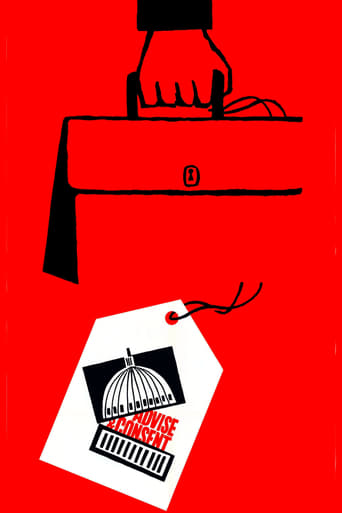kijii
Based on Allen Drury's 1960 Pulitzer Prize-winning novel, this story may have seemed like a pot-boiler at the time. However, in looking back it seems almost tame compared to the Washington, D.C. that has emerged over the last forty years. The movie is big in scope and features an all-star cast. It takes us back to the height of the Cold War and its effects on Washington politics. It shows us a time when there were conservatives and liberals in both parties. Also, it gives us a glimpse of what the 'good ol boy's Senate might have looked like then if the public had had the 24-hour news access of cable TV. As the movie begins, the President (Franchot Tone) has just named a new Secretary of State. His nominee is the controversial Robert A. Leffingwell (Henry Fonda), a liberal 'egghead' from the University of Chicago. The problem is getting him approved by the Senate. The drama revolves around the political ploys, from all sides, to either get him confirmed or rejected. The cards are staked against his confirmation in both the president's party, who holds the majority in the Senate (probably closest to the Democratic Party of that time) and the minority party. A quick confirmation of Leffingwell is needed because the president's health is failing, even though neither his vice president (Lew Ayres) nor most senators know the full extent of his medical condition. The president's closet allies for helping him get Leffingwell confirmed comes from the Senate's majority leader (Walter Pidgeon) and majority whip (Paul Ford). Descent of Leffingwell's confirmation comes from the opposing party and Dixiecrates like South Carolina's Senator Cooley (Charles Laughton--in his last movie performance). This descent is based on the perception that he is soft on Communism. The Senate subcommittee on the confirmation is headed by Utah's Senator Brigham Anderson (Don Murray). Wyoming Senator Van Ackerman (George Grizzard), a self-appointed, anti-cliquish populist challenges the choice of Anderson for the chairman of the subcommittee, but to no avail.When Senator Cooley is invited to sit in on the subcommittee's hearings as a guest and ask questions of Leffingwell, he tries to de-rail his nomination by using a witness, Herbert Gelman (Burgess Meredith), from Chicago. Gelman claims that he and Leffingwell were once involved in a Communist cell together in Chicago and that Leffingwell once tried to silence him about talking about this association. Under cross- examination from Leffingwell, Gleman's testimony is discredited on several important points, thus discrediting his entire testimony. Nevertheless, Leffingwell asks the president to withdraw his name from consideration because he had lied under oath before the subcommittee. (He HAD once flirted with Communism in that cell in Chicago in spite of his testimony to the contrary.)This perjury information is forwarded to the subcommittee's chairman, Senator Anderson, and he assumes that the president will put forth a new nominee for Secretary of State. But, at a press dinner, the president continues to support Leffingwell in spite of Senator Cooley's opposition and Senator Anderson's insistence to replace him. However, just as Leffingwell's past is revealed by the unscrupulous Senator Cooley, Senator Anderson's past surfaces when he is threatened by an anonymous blackmailer about once flirting with homosexuality. As the movie twists and turns towards its climax, the political drama increases to a crescendo before finally coming to an end. Other actors in this movie include Gene Tierney as the majority leader's lover; Betty White as the only woman senator (from Kansas); and Peter Lawford as the senator from Rhode Island. Peter Lawford was President Kennedy's brother-in-law at the time this movie was made--- timely in a political movie at that the time.
richard-1787
This movie is too long, but once it finally gets going - once we find out what Brig Anderson is being blackmailed for, and then the political maneuvering that goes on in the Senate - it moves to a conclusion with real dramatic power, in part because of good direction, in part because of fine acting all the way around.Others have weighed in on the various virtues - and defects - of the movie. I thought I'd address a point that doesn't seem to have been discussed: the portrayal of Brig Anderson as a man who had a homosexual relationship.Late in the movie we learn that the handsome young senator Brigham Anderson had a homosexual relationship during WW II while stationed in Hawaii. This is not presented as an anonymous encounter in an airport men's room or something like that, but rather as an emotional, and therefore we must assume romantic, relationship between two men. We see Anderson's "Dean John" letter to his war-time companion, Ray, in which he declares the relationship a mistake and tells Ray he is now going to lead the life of a straight man. We also see a picture of the two of them as a lay-bedecked, smiling couple.Earlier in the movie, before we have reason to suspect why, Anderson's wife says something about their marriage not having been very "exciting," which suggests that there was something wrong with their sex life.If we put that together in retrospect, we conclude that Anderson did not "leave behind" his homosexuality when he returned to the mainland after the war, but rather "settled for" a heterosexual marriage that was not fulfilling for him sexually.Given that, the portrayal of Anderson, which is uniformly positive if, in the end, very sad, is interesting. He is a man of principle who fights for what he believes to be right. (Granted, that included a hatred of Communism, but the movie was made in 1962, the era of the Cuban missile crisis.) The only other glimpse we get of gay men in the movie is very short: a brief scene inside a gay bar. It really doesn't seem out of the ordinary.
mark.waltz
Soon to be celebrating its 50th Anniversary, this political drama of senatorial disputes over the President's choice of a replacement for the recently deceased Secretary of State is right on the money in the sense of its closeness to the current political climate, both statewide and nationwide. In an era when people are losing faith in the people they've elected to government office, this film is almost serio-comic in its look at the political squabbling still going on today. (Just watch C-Span after viewing this to compare!) The movie is overstuffed with stars, both old and new, and it is hard sometimes to keep track of who is on what side and pay close attention to each performance. Henry Fonda plays the chosen Secretary of State replacement, but he isn't the focus. That responsibility goes to another legend, Walter Pidgeon, as the Senate Majority Leader, and young Don Murray as the head of the committee questioning Fonda. In his last film role, Charles Laughton gives an almost haunting performance as the senior senator opposing Pidgeon's support of Fonda as SOS. It is difficult to tell whether it is his performance or his obvious health issues that makes his quiet performance so mesmerizing. Burgess Meredith, a veteran of several Otto Preminger films, underacts unlike his overly hammy performance in the camp classic "Hurry Sundown" and others.The lovely Gene Tierney, who was Preminger's heroine in the classic film noir "Laura", is wasted here as a Washington hostess. She is still lovely, but the role lacks any real meat. Betty White adds a humorous touch in her brief role as the only female Senator shown on screen, one of the few film roles she would do before her iconic TV roles on "The Mary Tyler Moore Show" and "Golden Girls". A few other actors later popular on TV include Will Geer ("The Waltons") as the Senate Minority Leader and Broadway musical veteran Inga Swenson ("Benson"), who is totally unrecognizable.There's only a limited amount of domestic drama to offset all of the political intrigue, mostly surrounding Don Murray's character who faces a shocking blackmail attempt involving a homosexual encounter he had years ago. Preminger takes the cameras into a Washington DC gay bar where Murray goes to confront his old lover and is disgusted by what he sees. Preminger doesn't take a stance for or against the gay lifestyle, but simply presents it "as is" long before Stonewall where the "fringe of society" could not be out in the open. His direction is never boring, and the camera shots of the underground tram system (previously seen in MGM's "Washington Story") is quite interesting as well.It is also interesting to see Senators walking around Washington DC as if they could never be recognized, something which could never happen today. As both a historical and unchanged view of what man's disagreements politically can do to their effectiveness on the job, "Advise and Consent" is both ironic and frightening over the power we give the people we elect.
vincentlynch-moonoi
This is a truly remarkable film on so many levels. First, just in regard to some facts about the film: Having lived in the D.C., I was amazed at how many scenes were filmed on location, even in the Capitol itself. Dr. Martin Luther King Jr. was offered a cameo role as a U.S. Senator by director Preminger, but he declined. That Preminger hired several blacklisted actors to play supporting roles -- Burgess Meredith, Lew Ayers and Will Geer. That the topic of homosexuality was a key part of the script back in 1962. That a gay bar was depicted. That it was the comeback film for the mentally ill Gene Tierney. That current favorite Betty White made her film debut here. That it was Charles Laughton's last film before his death of cancer. And that Peter Lawford played the role of a senator while his brother-in-law was the actual president.Then there's the fact that despite being nearly 50 years ago, the Senate and government clearly still work much the same when it comes to presidential appointments. So many situations here will remind you of today's political climate, although now we are without the Cold War, which figures into this plot.The performances in this film are as solid as they get. Franchot Tone excellent as the dying president. Lew Ayers solid as the vice president. Henry Fonda excellent as the nominee for Secretary Of State. Don Murray excellent as a senator being blackmailed. Peter Lawford surprisingly good as a senator. Walter Pidgeon excellent as the Senate majority leader. But special kudos belong to Charles Laughton, who -- though not one of my favorites -- gives the performance of a lifetime...although there were other performances of his that were equally wonderful (for example, his role in "This Land Is Mine"). A fitting end of a career to a man who would be dead not long after the premiere of his last film.Excellent film in all regards.





